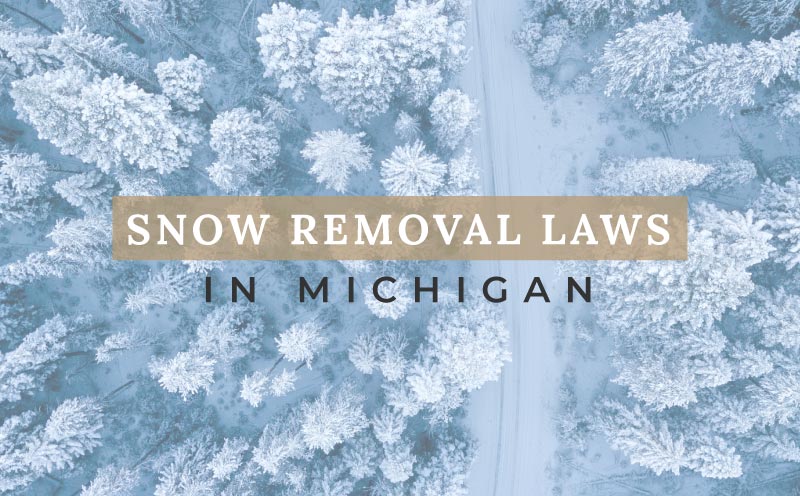Snowy Sidewalks, Cars, and the Michigan Snow Removal Law

Michigan winters are notorious for harsh conditions, mounting snow, frigid temperatures, and ice. Knowing how to handle these conditions not only saves lives but can also save you money since snowy sidewalks often incur hefty fines. Several of our attorneys regularly appear on media segments to cover Michigan snow removal law, rules regarding cars covered in snow, snowy sidewalks, and more. Freshen up on the rules that apply to you below.
Michigan Snow Removal Law
When it comes to property, Michigan snow removal laws include local law, sometimes called local ordinances, as well as state statutes. State statutes apply to everybody. First, according to state statute, when removing snow, you cannot “deposit or cause to be deposited snow, ice, or slush onto or across the roadway, or on the shoulder of the roadway that obstructs the safety vision of a driver.” In short, when removing snow from your property, you can’t put it in a place that obstructs someone’s safety vision.
Snowy Sidewalks and Local Snow Ordinances
When talking about sidewalk snow, we are generally dealing with local snow removal ordinances. As a Grand Rapids personal injury attorney, Tom focused his discussion in this segment on the Grand Rapids snow ordinance.
Grand Rapids has a very specific snow removal ordinance that applies to both homeowners and occupants within the city. The ordinance clearly requires homeowners and renters to clear snow and ice from sidewalks within 24-hours of the accumulation.
Consequences of Not Removing Snow from Your Property
Furthermore, Grand Rapids’ snow removal ordinance states that if the owner or occupant of the home has been notified and fails to take action to remove the snow within 48-hours, the city can then remove the snow itself. The city does not provide this service for free, and therefore assesses a snow removal fee, along with other potential administrative fees, to the homeowner or occupant.
Injuries Due to Snowy Sidewalks
Under a complicated area of law known as premises liability, a premises owner may be held liable for personal injuries that a victim sustains as a result of dangerous conditions on the property. Failing to clear snow and ice can lead to people getting hurt. Always take care of your property and be a courteous neighbor.
Cars Covered In Snow
Michigan law prohibits the operation of a vehicle if any object impairs the driver’s line of sight. Unfortunately, for those of us who dread clearing snow off our cars in the morning, this includes snow. Driver’s must either be able to see out of their rear windshield OR out of their side mirrors AND rearview mirror. However, it is also illegal for snow or ice to fall off cars and onto the road while driving. Drivers who fail to clear their cars properly may face tickets and fines.
A specific Michigan state law states that no one can have any object on that obstructs the vision of the driver. Unfortunately, for those of us who dread clearing snow off our cars in the morning, this includes snow. Snow accumulation on the windshield, as we as the side or back windows, that obstructs the driver’s view is in direct violation of state statute and must be removed before operating the vehicle.
Interestingly enough, Michigan has another state statute that reads as follows: “A person shall not deposit or cause to be deposited snow, ice, or slush on any roadway or highway.” This additional statute clearly states that a driver cannot do anything that causes snow or ice or slush to leave your car and end up in the roadway. When people fail to properly clear their car, oftentimes it is loosened and comes off as they begin driving, landing in the roadway. Failing to properly remove snow from the vehicle leading to it ending up in the roadway is in direct violation of this second statute. It’s important to completely clean off your vehicle, even the parts that don’t obstruct your view, before taking off.
Consequences of Not Cleaning Snow off of Your Car
Violating either of these two statutes may result in civil fines. However, consequences are more far-reaching than just financial. In Michigan, our general standard is that every motorist owes other motorists a duty to exercise reasonable care. While some may try to claim reasonableness is in the eye of the beholder, our state statutes are designed to help inform what is reasonable. Therefore, if a driver violates either of these statutes and doing so causes a car accident leading to another person’s injuries, that is evidence of not using reasonable care. Failing to use reasonable care can subject the motorist to civil liability in addition to other types of fines and recourse under other state statute.

